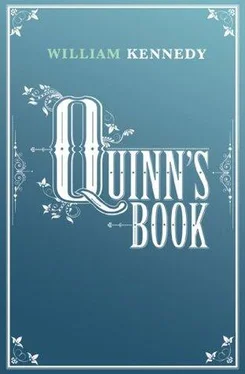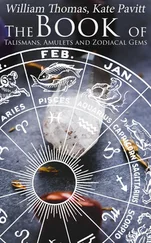And so I have sought out the person with whom I have most in common: Joey Ryan of the bleeding nose — but bleeding no more — seated now at the kitchen table eating Matty’s chicken soup and corn bread. I told him I was sorry for his trouble and that my father was dead also, and at least he had his mother with him, but that my mother was dead and so was my sister.
“You’re an orphan, then,” he said.
“I am.”
“What do they do to orphans? Do they kill them?”
“I’ve never heard of that,” I said, “and they haven’t killed me yet. But sometimes they put them in orphan homes, and sometimes they let them run loose.”
“I’d fancy to run loose,” he said.
“I would too,” I said.
“Run loose till I grow up enough to solve the man who killed me father.”
“How will you solve him?”
“I’ll break his skull.”
“You aren’t big enough for that.”
“I’ll get bigger and find him and break his skull like he broke me father’s.”
“They’ll hang you.”
“Do they hang orphans?”
“They hang you for breaking a man’s skull.”
“Will they hang the man that killed me father?”
“If they catch him they might.”
“I’ll hang him meself, and then I’ll cut off his head.”
Maud, the boy is a little fellow, no bigger than yourself. But vengeance burns in his eyes, and if he doesn’t break one man’s skull before long, he’ll break another’s. Anger took seed in him farther back than the clubbing of his father, as I learned when I asked where he came from in Ireland.
“From a ditch near Cashel,” he said. “The landlord tumbled our house and put us off our land, and me father piled all we owned in a cart and we pushed it till we couldn’t climb the hill. Then we lived in the ditch and used the wagon as a roof. We could see the Galty Mountains from the ditch. They tumbled our house to make room for the landlord’s cows. ‘They’re in grave need of pasture,’ the landlord told me pa. Then we left the ditch, threw things away to lighten our load, and the three of us hauled the cart up the mountain, a terrible high mountain of four hundred feet it was, and me sister settin’ the block at the wheel. We done it at last and got over the mountain, but goin’ down the back side was near as troublesome as goin’ up the front, and we almost lost the cart two or three assorted times. We begged food, and when we couldn’t get any we stole it, or we ate grass. Then we went to me uncle’s place on the road to Tipperary and he took us in and paid for Pa to go to America. Pa himself is all of us that went over. The night before he left we had a wake for his leavin’, with me ma keenin’ for hours over his goin’. ‘Ye won’t come back for us,’ she kept saying. It was near to bury him, is what it was. But he sent remittances and got us all over here, me and me sister and me mother. And didn’t we all come to this town of Albany, because we couldn’t fit in New York in the wee room Pa lived in. We was here just a few weeks and no money left when he got the foundry job, and then, a little after that, they broke his skull, the man did, the bastard man.”
I talked more with him, Maud, but it was so painful I soon left him and thought of going to bed, for I could find no one else to talk to. People were all over the house talking of the coming fight and how awful it would be, and I knew I would watch it when it came. More death is what I thought, and that put me in mind of the Dood Kamer , where you and I watched John and Magdalena and Hillegond love each other, after a fashion, and that was where I sat and read your letter.
Dearest Daniel [you began],
I write to you because a person named Joseph K. Moran has said he met you and that you asked for my well-being, for which I send gratitude. I worry, too, about your well-being, for you know I consider you my true love for all time and ever after, and am awaiting the fulfillment of your promise to steal me away from my loving but inconstant aunt and her companion, the ridiculous John McGee. That man had the boldness to tell me you stole money from us, then jumped off the canalboat and ran away. I told him he was a poor liar and a worse scoundrel, and when I received the full impact of your absence I went into a swoon and as in the past I refused to eat, coming so near to death I terrified everyone. I think you would have been quite proud of me. A most peculiar thing happened in my starving condition. I could see what people around me were thinking, not an uplifting thing to be able to do. I also was able to communicate with spirits of the dead, or at least I think they are dead. They certainly seem to be spirits, for no one can see them, not even I. Yet they make violent sounds, of which everyone save myself is terribly frightened. I rather like their rhythms.
Please note that we will soon be in Saratoga Springs, where my aunt is to perform her dancing. I have assisted in some of her performances and may again, but will not now say how, as I wish to surprise you. We arrive in Saratoga May 30th, and I expect to see you soon thereafter, at which time we shall make plans for you to steal me. You have my love forever and a day, and another forever and another day.
Maud
P.S. I saw Joseph K. Moran perform in Utica and thought him an affecting person. Please thank him for putting me in touch with you. I await you, Daniel Quinn.
Maud, nothing in my life has been equivalent to the thrill of reading this letter. I confess I had hoped for a hint of your affection, but am overwhelmed by what you have said. I must add that your meetings with spirits and your plans involving me give me great unrest that I cannot solve of the instant. You consider me more powerful than I am. However, I will do what I am capable of doing.
Maud, I send you love.
Capricorn brought the news that the warring factions from the foundry were assuming positions. Lyman said he feared that if word of the presence of the Ryans in the mansion reached Alfie, he and his cronies might seek satisfaction of the bloodlust that was upon them. Before sunrise the call went out for all in the mansion to be ready, and so Hillegond took Petrus’s pistol from its case, loaded it, and sat with it in the lap of her night robe; and Capricorn laid four rifles and two more pistols on the dining table. I could not believe we were anticipating that men from the foundry would invade this grand home to kill children.
As for Joey, he kept himself busy through the night creating a slungshot, a bludgeon fashioned from a rock wrapped in oilcloth and wound tight with string. I saw him in an upstairs hallway flexing his creation cleverly: slapping it with thuds against his left palm. When I saw his mother, Margaret Ryan, and his sister, Molly, at morning, they looked no less affrighted than they had the previous evening, but immeasurably more comely with clean skin and hair and fresh clothing.
Dorf Miller and his company, as well as Emmett and Will, had left the mansion during the night. Lyman stayed in the room long reserved for him on the fourth floor — his aerie, he called it — which gave him his preferred morning view of the Staats woodland and creek, and of the pond Petrus built when Hillegond first became enamored of the wild ducks that inhabited the swamp.
By the first rays of the morning sun the tea was steeping in the kitchen, Matty was taking bread from the oven, and our cluster of souls was gathering near the warmth of the fire. The good feeling among us all seemed inappropriate with a death struggle in the offing, but I attest that thirteen years hence the same feelings would prevail in me when, as a correspondent in the war, I’d speak with soldiers and other journalists around a fire. We would drink coffee of the rankest order and convince each other it was fitting nectar for those about to conquer, or die, or both, or neither.
Читать дальше












